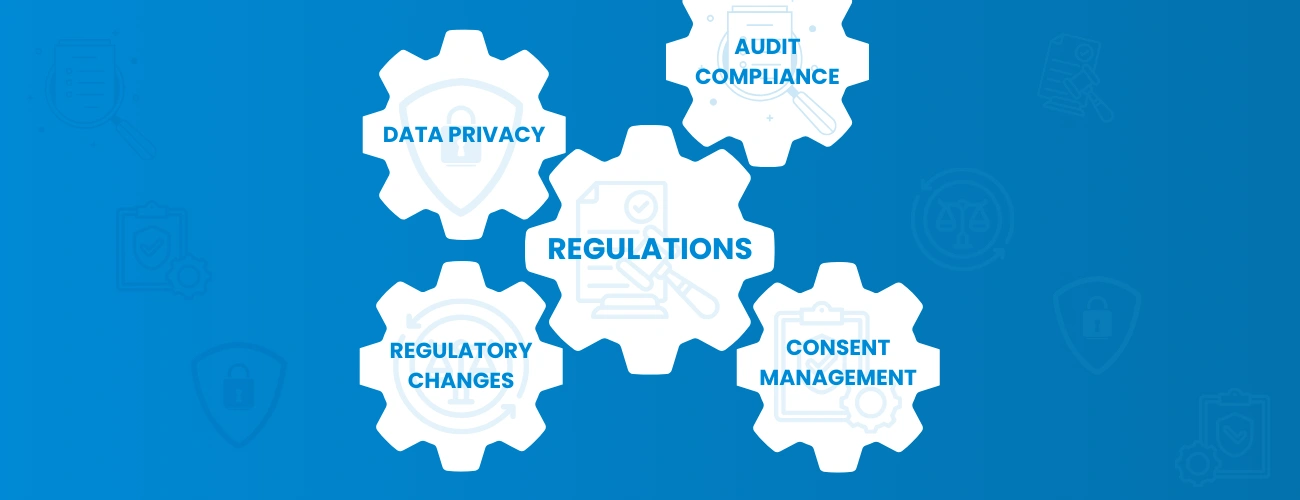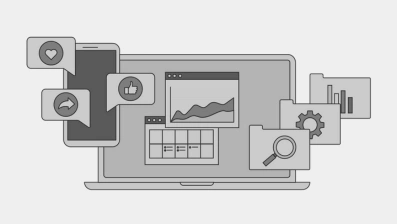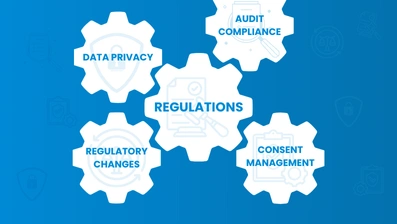In today's fast-paced digital landscape, businesses are increasingly turning to Digital Experience Platforms (DXP) to provide seamless and personalized customer experiences across multiple channels. But with the growing reliance on these platforms, understanding and adhering to DXP regulations has never been more crucial. Whether you're managing customer data, ensuring privacy, or meeting industry-specific compliance standards, navigating the complex world of DXP compliance can be daunting.
Enter Kentico DXP solutions—a powerful tool designed to help businesses not only create exceptional digital experiences but also stay on the right side of the law. In this blog, we'll dive deep into what DXP regulations entail, the challenges you might face, and how to ensure your platform remains compliant.
Understanding DXP and Its Importance
So, what exactly is a Digital Experience Platform (DXP), and why is it becoming a buzzword in the business world?
In simple terms, a DXP is a comprehensive suite of tools designed to help businesses deliver consistent, personalized, and engaging experiences to their customers across multiple digital touchpoints. Whether it's through websites, mobile apps, social media, or any other digital channel, a DXP ensures that your brand message is cohesive and your customer journey is seamless.
But here's the thing—while DXPs offer immense potential, they also come with a set of challenges, particularly when it comes to DXP compliance. With the increasing amount of data being collected, stored, and processed, businesses must ensure that their DXP is not only efficient but also adheres to the various DXP regulations that govern data privacy, security, and more.
This is where Kentico DXP shines. It’s not just about creating amazing digital experiences; it's also about doing so in a way that's compliant with the latest regulatory standards. By leveraging Kentico DXP, businesses can confidently navigate the complexities of DXP regulations while focusing on what truly matters—delivering value to their customers.
The Evolution of DXP Regulations
The digital landscape has evolved rapidly over the past decade, and with it, the rules governing Digital Experience Platforms (DXPs) have also transformed. Originally, DXP regulations were relatively straightforward, focusing mainly on basic data protection and privacy concerns. But as digital interactions have become more complex, so too have the regulations.
DXP compliance is no longer just about ticking off a checklist of requirements; it’s about adapting to a dynamic regulatory environment that’s continuously shifting in response to new technologies, threats, and consumer expectations. The introduction of laws like GDPR in Europe and CCPA in California marked significant turning points, setting stringent standards for how businesses handle personal data across digital platforms.
Moreover, industry-specific regulations, such as HIPAA for healthcare, have added additional layers of complexity. These rules require businesses to implement robust security measures and maintain strict control over how sensitive information is accessed and shared.
This evolving regulatory landscape means that staying compliant isn’t a one-time effort; it requires ongoing vigilance and adaptability. That’s why choosing a platform like Kentico DXP can be a game-changer. Kentico is designed with compliance in mind, offering built-in tools and features that help businesses stay ahead of regulatory changes and avoid costly penalties.
As we move forward, it’s clear that DXP regulations will continue to evolve, driven by advances in technology and shifts in public policy. Businesses that want to stay competitive need to be proactive, embracing platforms that not only enhance their digital presence but also ensure they remain compliant in an ever-changing world.
Key Regulatory Frameworks Affecting DXPs
When managing a Digital Experience Platform (DXP), understanding and complying with the relevant regulatory frameworks is critical to maintaining customer trust and avoiding legal pitfalls. Several key regulatory frameworks directly impact how businesses manage data, ensure privacy, and deliver digital experiences. Let’s take a closer look at some of the most significant ones:
GDPR and DXPs
The General Data Protection Regulation (GDPR), implemented in May 2018, is a comprehensive data protection law that applies to all businesses operating within the European Union (EU) or dealing with EU citizens. GDPR represents a major shift in how personal data must be handled, setting strict guidelines on data collection, processing, and storage.
For any DXP that interacts with users in the EU, GDPR compliance is mandatory. The regulation requires businesses to obtain explicit consent from users before collecting personal data, which includes everything from email addresses to IP addresses. Additionally, businesses must provide users with clear and accessible information on how their data will be used and offer the ability to withdraw consent at any time.
Another critical aspect of GDPR is the right to be forgotten, which allows users to request the deletion of their personal data from a company’s systems. Non-compliance with GDPR can result in hefty fines—up to 4% of a company’s global annual revenue or €20 million, whichever is higher.
Kentico DXP is built with GDPR in mind, offering tools such as consent management, data anonymization, and audit logs to ensure businesses can meet GDPR requirements efficiently. By integrating these features, Kentico DXP helps businesses maintain compliance while still delivering personalized digital experiences.
CCPA Compliance
The California Consumer Privacy Act (CCPA), effective since January 1, 2020, is one of the most stringent data privacy laws in the United States. Often compared to GDPR, CCPA focuses on protecting the personal information of California residents and applies to businesses that collect or sell such data.
Under CCPA, businesses must inform consumers about the categories of personal information they collect and the purposes for which the information will be used. Consumers also have the right to request that their data not be sold to third parties and can opt-out of data sales entirely. Additionally, CCPA mandates that businesses provide a clear and conspicuous "Do Not Sell My Personal Information" link on their websites.
For businesses using a DXP in California or interacting with California residents, CCPA compliance is essential. The law imposes penalties for non-compliance, including fines of up to $7,500 per violation for intentional violations.
Kentico DXP is designed to help businesses navigate the complexities of CCPA. With features like user data management, privacy preference centers, and automated data processing workflows, Kentico enables businesses to manage consumer data transparently and in line with CCPA requirements.
HIPAA and Healthcare DXPs
In the healthcare sector, the Health Insurance Portability and Accountability Act (HIPAA) is the cornerstone of patient data protection. Enacted in 1996, HIPAA establishes national standards for the protection of health information, ensuring that patient data is kept confidential and secure.
HIPAA applies to any DXP used by healthcare providers, health plans, and their business associates. Compliance with HIPAA requires implementing strict security measures, including encryption of data at rest and in transit, regular risk assessments, and access controls to ensure that only authorized personnel can view or modify sensitive health information.
HIPAA also mandates the use of Business Associate Agreements (BAAs) between healthcare entities and their service providers, including DXP vendors. These agreements outline the responsibilities of each party in protecting patient data and complying with HIPAA requirements.
Kentico DXP can be configured to meet HIPAA standards, offering features such as end-to-end encryption, secure access controls, and detailed audit trails. These capabilities help healthcare organizations manage patient data securely while complying with HIPAA regulations.
Industry-Specific Regulations
Beyond GDPR, CCPA, and HIPAA, many industries are governed by additional regulations that impact how they must manage digital experiences and data. Here are a few examples:
PCI DSS (Payment Card Industry Data Security Standard):This set of security standards is designed to protect cardholder data and applies to any organization that handles credit card transactions. For DXPs used in the financial sector or e-commerce, PCI DSS compliance is crucial to prevent data breaches and maintain customer trust. Kentico DXP can be configured to support PCI DSS requirements by implementing secure payment processing and data encryption.
FERPA (Family Educational Rights and Privacy Act): This U.S. federal law protects the privacy of student education records. Educational institutions using a DXP must ensure that student data is handled in accordance with FERPA guidelines, including limiting access to authorized personnel and obtaining parental consent when necessary.
SOX (Sarbanes-Oxley Act): While primarily focused on financial reporting, SOX also has implications for data management and security in publicly traded companies. Ensuring that a DXP complies with SOX means implementing robust data integrity and access controls to prevent unauthorized access or tampering with financial information.
Understanding the specific regulatory landscape for your industry is crucial to maintaining DXP compliance. By leveraging a platform like Kentico DXP, businesses can tailor their digital experiences to meet these diverse regulatory requirements, ensuring that they operate within the bounds of the law while still delivering exceptional customer experiences.
Each of these regulatory frameworks presents unique challenges, but they all share a common goal: protecting users' data and ensuring that businesses operate transparently and ethically. Kentico DXP is equipped with the tools and features to help businesses navigate these complexities, providing a solid foundation for both compliance and innovation.
Challenges of Complying with DXP Regulations
Navigating the maze of DXP regulations can be challenging for businesses, especially as these regulations continue to evolve and become more stringent. Compliance isn't just about checking a few boxes—it's an ongoing process that requires constant attention and adaptation. Here are some of the key challenges businesses face in ensuring their Digital Experience Platform (DXP) remains compliant:
1. Data Privacy and Security
With regulations like GDPR and CCPA, data privacy and security have become top priorities. Businesses must implement robust measures to protect personal data from breaches and unauthorized access. This includes encrypting data, ensuring secure data transfer, and regularly updating security protocols. The challenge lies in maintaining these high standards consistently across all digital touchpoints managed by your DXP.
2. Consent Management
Another significant challenge is managing user consent. Regulations now require businesses to obtain clear and explicit consent from users before collecting or processing their data. This can be complicated when dealing with a diverse audience across multiple channels. Businesses must ensure their DXP has effective tools for managing consent, including mechanisms for users to easily opt in or out.
3. Keeping Up with Regulatory Changes
Regulations affecting DXPs are constantly evolving. New laws are introduced, and existing ones are updated, making it difficult for businesses to stay compliant. Keeping up with these changes requires ongoing monitoring and the ability to quickly adapt your DXP to new requirements. Without the right tools and processes, this can become a significant burden.
4. Integrating Compliance Across Multiple Platforms
Many businesses use a variety of digital platforms and tools to manage their customer interactions. Ensuring that all these systems comply with relevant DXP regulations can be a complex task. It requires seamless integration and consistent compliance standards across all platforms, which is easier said than done.
5. High Costs of Non-Compliance
The consequences of non-compliance can be severe, including hefty fines, legal battles, and damage to your brand’s reputation. Businesses must invest in compliance not just as a legal obligation but as a critical aspect of their risk management strategy. The challenge is balancing the costs of compliance with the need to deliver innovative and engaging digital experiences.
Navigating these challenges requires a strategic approach and the right tools. Kentico DXP offers a comprehensive suite of features designed to help businesses manage these complexities, from data security and consent management to staying updated on regulatory changes. By leveraging Kentico, businesses can focus on delivering exceptional digital experiences while ensuring they remain compliant with all relevant regulations.
Best Practices for Ensuring DXP Compliance
Ensuring DXP compliance requires more than just understanding the regulations—it involves adopting best practices that integrate compliance into the very fabric of your digital experience strategy. Here are some key strategies to help you maintain compliance effectively:
1. Prioritize Data Privacy and Security
The foundation of any compliant Digital Experience Platform (DXP) is robust data privacy and security. Start by implementing strong encryption methods for both data at rest and in transit. Regularly update your security protocols to defend against emerging threats. It’s also essential to conduct periodic security audits to identify and address vulnerabilities. Kentico DXP offers built-in security features like SSL support, secure user authentication, and role-based access controls, making it easier to protect your data.
2. Implement Effective Consent Management
Managing user consent is a critical aspect of DXP regulations like GDPR and CCPA. Ensure your DXP includes tools for capturing, storing, and managing consent in a transparent manner. This means providing users with clear options to opt in or out of data collection and processing, as well as easy access to change their preferences. Kentico DXP enables businesses to integrate consent management into their digital experiences, ensuring compliance while enhancing user trust.
3. Regularly Monitor and Audit Compliance
Compliance is not a one-time effort but an ongoing process. Regularly monitor your DXP to ensure it meets all current regulatory requirements. This includes conducting audits to verify that your data handling practices are compliant and identifying any areas that need improvement. Kentico DXP provides detailed audit logs and reporting features that help businesses keep track of their compliance status.
4. Stay Informed About Regulatory Changes
Regulations affecting DXPs are constantly evolving, making it crucial to stay informed about new laws and updates to existing ones. Designate a team or partner with a legal expert to monitor these changes and assess their impact on your DXP. Proactive adaptation to regulatory shifts can save your business from non-compliance risks. Kentico DXP is designed to be flexible, allowing for quick adjustments to meet new regulatory requirements.
5. Choose the Right DXP Platform
Selecting a DXP that prioritizes compliance from the ground up is essential. Look for platforms that offer comprehensive compliance features, such as data encryption, consent management, and robust security protocols. Kentico DXP is an excellent choice, providing businesses with a solid foundation for building compliant digital experiences while also offering the tools needed to manage and maintain that compliance over time.
By following these best practices, businesses can not only meet DXP compliance requirements but also build a trustworthy digital presence that resonates with users.
The Role of Kentico in Navigating DXP Regulations
When it comes to navigating the complex world of DXP regulations, having the right platform can make all the difference. Kentico DXP stands out as a comprehensive solution that not only empowers businesses to create exceptional digital experiences but also ensures compliance with various regulatory frameworks. Here’s how Kentico helps businesses stay compliant:
1. Built-in Data Security Features
Kentico DXP is designed with security at its core, providing businesses with the tools they need to protect sensitive data. From end-to-end encryption to secure authentication mechanisms, Kentico ensures that your data is safeguarded against unauthorized access and breaches. The platform’s role-based access controls allow you to manage who has access to specific data, ensuring that only authorized personnel can view or edit sensitive information.
2. Advanced Consent Management
Managing user consent is a critical aspect of DXP compliance, especially under regulations like GDPR and CCPA. Kentico DXP offers advanced consent management features that allow businesses to easily capture, store, and manage user consent. This includes customizable consent forms, clear opt-in and opt-out options, and detailed logs that track user preferences. With Kentico, businesses can ensure that they are collecting and processing data in accordance with user consent, thereby reducing the risk of non-compliance.
3. Compliance-Ready Audit Tools
Regular audits are essential for maintaining DXP compliance. Kentico DXP includes comprehensive audit tools that enable businesses to monitor their compliance status continuously. These tools provide detailed logs and reports on data handling practices, user consent management, and security measures. This makes it easier to identify potential compliance gaps and address them before they become issues.
4. Flexibility to Adapt to Regulatory Changes
One of the biggest challenges in maintaining DXP compliance is adapting to new and evolving regulations. Kentico DXP is built to be flexible, allowing businesses to quickly implement changes as needed to meet new regulatory requirements. Whether it’s updating consent management practices or enhancing security protocols, Kentico provides the tools and support needed to stay ahead of regulatory changes.
5. Support for Industry-Specific Regulations
Different industries have unique regulatory requirements, and Kentico DXP is equipped to handle these variations. Whether you’re in healthcare, finance, education, or another regulated industry, Kentico offers features and configurations that help you meet industry-specific compliance standards, such as HIPAA or PCI DSS. This ensures that your digital experiences are not only engaging but also legally compliant across all sectors.
6. Continuous Innovation and Updates
Compliance is an ongoing process, and Kentico is committed to helping businesses stay compliant through continuous innovation and updates. The platform regularly rolls out new features and enhancements designed to address emerging regulatory requirements and security challenges. By keeping your Kentico DXP up to date, you can ensure that your digital experiences remain compliant and secure over time.
In a world where DXP regulations are becoming increasingly complex, Kentico DXP offers a reliable, compliant, and user-friendly platform that supports your business’s digital strategy. By leveraging Kentico’s built-in compliance features, businesses can focus on creating outstanding digital experiences while confidently navigating the regulatory landscape.
Future Trends in DXP Regulations
As technology continues to evolve, so too do the regulations that govern Digital Experience Platforms (DXPs). Staying ahead of these trends is crucial for businesses that want to remain compliant while delivering cutting-edge digital experiences. Here are some of the key trends we anticipate in the future of DXP regulations:
1. Increased Focus on AI and Data Ethics
With the rise of artificial intelligence (AI) and machine learning in DXPs, regulators are paying closer attention to how these technologies are used. Future regulations may impose stricter guidelines on how AI-driven DXPs collect, process, and use data, particularly when it comes to avoiding bias and ensuring transparency. Businesses will need to adopt ethical AI practices and be prepared to justify their data usage to both regulators and consumers.
2. Stricter Data Localization Requirements
Data localization—requiring data to be stored and processed within specific geographic boundaries—is becoming more common in global regulations. Countries are increasingly enacting laws that restrict cross-border data flows, meaning DXPs may need to adapt by setting up regional data centers or adopting new data management strategies. Compliance with these localization requirements will be key for businesses operating in multiple regions.
3. Enhanced Consumer Rights and Controls
We’re seeing a trend towards granting consumers more control over their personal data. Future DXP regulations may further empower users with rights such as data portability, more granular consent options, and enhanced transparency into how their data is being used. Businesses will need to implement systems that allow users to easily manage their data preferences and access detailed information about how their data is handled.
4. Integration of Cybersecurity Standards
As cyber threats become more sophisticated, regulations will likely incorporate stricter cybersecurity standards for DXPs. This could include mandatory encryption, multi-factor authentication, and more rigorous breach notification requirements. Businesses will need to invest in advanced security measures to not only protect user data but also to stay compliant with these evolving standards.
5. Expanding Regulatory Scope Beyond Traditional Sectors
Regulations that were once confined to specific industries, such as finance or healthcare, are likely to expand to other sectors as DXPs become more ubiquitous. This means that even industries that have traditionally been less regulated may face new compliance challenges. Businesses will need to stay informed about regulatory changes that could impact their DXP strategy, regardless of their industry.
6. Proactive Compliance as a Competitive Advantage
As regulations become more complex, businesses that proactively address DXP compliance will stand out in the marketplace. Consumers and partners are increasingly valuing transparency and accountability, and companies that can demonstrate a strong commitment to compliance will build trust and loyalty. Kentico DXP is positioned to help businesses stay ahead of these trends by providing the tools needed to adapt to future regulatory landscapes.
By staying informed and prepared for these future trends, businesses can ensure that their DXPs not only comply with current regulations but are also ready to meet the challenges of tomorrow. Kentico DXP offers the flexibility and features needed to navigate these evolving demands, helping businesses remain compliant and competitive in an ever-changing digital world.
DotStark – Your Partner in Success
Looking for a reliable Kentico development company to transform your digital presence? Look no further than DotStark. As a leading Kentico development company, we specialize in creating powerful, customized digital experiences that drive results. Whether you're aiming to build a new website, enhance your digital marketing strategy, or ensure compliance with the latest DXP regulations, our expert team is here to help. With years of experience and a commitment to innovation, DotStark delivers Kentico solutions that align with your business goals. Partner with us to unlock the full potential of Kentico and take your digital strategy to the next level.
Conclusion
As the digital landscape continues to evolve, the importance of staying compliant with DXP regulations cannot be overstated. Businesses that effectively manage compliance not only avoid legal and financial penalties but also build stronger, more trusting relationships with their customers. The challenge lies in navigating the complex and ever-changing regulatory environment while still delivering exceptional digital experiences.
This is where Kentico DXP proves invaluable. With its robust security features, advanced consent management tools, and flexibility to adapt to new regulations, Kentico provides businesses with the foundation they need to stay compliant across all digital touchpoints. Whether you’re dealing with GDPR, CCPA, HIPAA, or other industry-specific regulations, Kentico DXP is equipped to handle the complexities of modern compliance.
Frequently Asked Questions
A Digital Experience Platform (DXP) is a suite of tools designed to manage and optimize customer experiences across various digital channels, such as websites, apps, and social media. Because DXPs handle large amounts of personal data, businesses must ensure that their platforms comply with regulations like GDPR, CCPA, and industry-specific rules to avoid penalties and protect user privacy.
Kentico DXP is equipped with features specifically designed to help businesses comply with GDPR, including advanced consent management tools, data anonymization, and robust security measures like encryption and access controls. These features ensure that businesses can collect, process, and store user data in accordance with GDPR requirements.
Non-compliance with DXP regulations can result in severe consequences, including hefty fines, legal action, and significant damage to your brand’s reputation. For example, under GDPR, fines can reach up to 4% of your company’s global annual revenue. Using a compliant platform like Kentico DXP helps mitigate these risks by ensuring your business adheres to all relevant regulations.
Yes, Kentico DXP can be configured to comply with industry-specific regulations such as HIPAA for healthcare. The platform includes features like end-to-end encryption, secure access controls, and detailed audit trails, making it suitable for managing sensitive data in regulated industries.
Staying informed about future regulatory changes is crucial for maintaining DXP compliance. Businesses should regularly monitor updates from regulatory bodies and consult with legal experts. Additionally, choosing a platform like Kentico DXP that is built to adapt to new regulations can help your business stay compliant as laws evolve.
Kentico DXP is scalable and flexible, making it suitable for businesses of all sizes. Whether you’re a small business or a large enterprise, Kentico provides the tools you need to manage digital experiences while staying compliant with relevant regulations.











 +91 9680599916
+91 9680599916
 vanshika@dotstark.com
vanshika@dotstark.com
